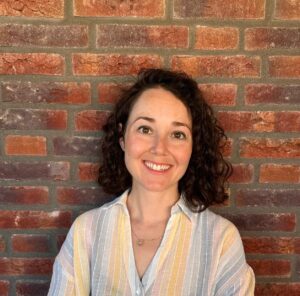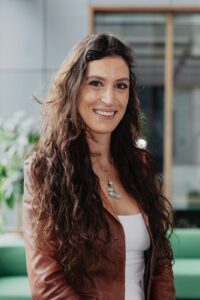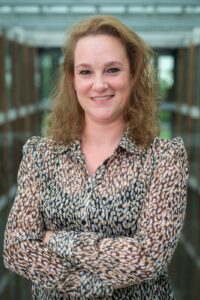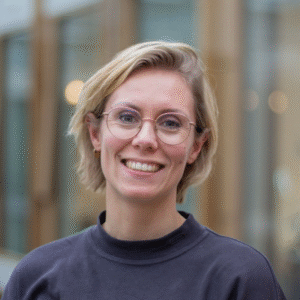Young NeurolabNL Core Team

Meet the Young NeurolabNL core team

Amy Abelmann
Amy Abelmann is a researcher at HAN University of Applied Sciences in the Technology for Health research group. She is also completing her PhD at Radboud University Nijmegen. Her expertise includes the use of technology in cognitive rehabilitation and general healthcare. During her PhD, she will focus on the development and investigation of the Karman Line, a set of games and mobile applications to support cognitive treatments for people with acquired brain injury (https://www.karmanlinedtx.com). At HAN, she conducts applied research into simulation education, VR applications, and digital accessibility. She is excited to be part of the Young NeurolabNL core team and to contribute to connecting and strengthening young researchers in the field of brain, behavior, and cognition.

Dr. Desiderio Cano Porras
Desiderio Cano Porras is a biomedical engineer and intersectorial researcher in the Department of Cognitive Science and Artificial Intelligence from Tilburg University. He has international experience on translational research, particularly in the use of emergent technologies such as virtual reality for rehabilitation of persons with neurological conditions (e.g. Parkinson’s disease) and for promoting self-management and behavioral change (e.g. VR in treatments of obesity). Desiderio is highly motivated to engage in a national strategy for connecting young researchers in the Netherlands, to strengthen their networking and professional development in Brain, Cognition and Behavior. Hence, his motivation in establishing the Young NeurolabNL.

Melanie Franse
Melanie Franse is a PhD candidate at Leiden University and the Netherlands Institute for Forensic Psychiatry and Psychology (NIFP), working within the SCIN project (funded by NeurolabNL). This project aims to improve screening and intervention within forensic youth care. By integrating neurobiological and neuropsychological measures into current screening practices, forensic interventions can be applied more effectively, tailored to individual needs. Melanie specifically focuses on the target group eligible for Adolescent Criminal Law.

Dr. Kubra Gulmez Karaca
Kübra Gülmez Karaca is an Assistant Professor and Principal Investigator at the Brain Center, UMC Utrecht. Her research investigates the cellular and molecular mechanisms of memory formation, stability, and fear relapse, with a focus on how stress or neuromodulatory systems shape neural representations of memories in the brain and memory expression. To address these questions, she implements a multidisciplinary approach that integrates molecular biology, behavioral analysis in rodents, AAV-mediated gene delivery, pharmacological interventions, and high-resolution imaging of cells and synaptic connectivity. Her team also aim at developing (novel) AAV-based tools for activity-dependent tagging and manipulation of genetically defined neuronal populations to advance our understanding of memory circuitry and inform therapeutic strategies for neurological disorders involving abnormal circuit activity.

Dr. Julia Henrich
Julia Henrich is a postdoctoral researcher at the Unit of Health, Medical and Neuropsychology Leiden University. Her background is in Health Psychology, with a particular interest for psychological therapies and biopsychological therapeutic mechanisms for patients with a chronic illness. Currently, she is coordinator for the NWA route NeurolabNL. Julia is also postdoctoral researcher for the Digital Society Health & Well-being team, which promotes the sustainable development and implementation of digital health interventions. Julia’s motivation to set-up Young NeurolabNL is to promote interdisciplinary research, visibility and career perspectives of young researchers in the field of Brain, Cognition and Behavior.

Dr. Florian Krause
Florian Krause is a researcher at the Donders Institute and RadboudUMC Nijmegen with a background in cognitive neuroscience and a special interest in linking neuroscientific insights to real-life. His approach of “ecological cognitive neuroscience” entails combining fundamental neurocognitive knowledge, advanced neuroimaging, and transferable mobile technology (mobile phone applications, wearable devices) to develop innovative new ways to promote and sustain optimal performance, mental health and well-being in daily life. Florian is also a strong proponent of Open Science and Team Science principles. He is the creator of the free scientific software Expyriment and the founder of the Biofeedback & Neurofeedback Community Nijmegen. Young NeurolabNL allows him to further contribute to making science more sustainable by supporting young researchers promoting these principles, sharing ideas on how to improve long-term perspectives within academia, as well as connecting with other sectors outside of academia.

Dr. Ewa Miedzobrodzka
Ewa Miedzobrodzka is a media psychologist and a postdoctoral researcher on a longitudinal project: ‘Digital media use and equal opportunities’ within the Youth and Digitalisation (JEDi) consortium. Her research interests focus on the effects of digital media (e.g., video games and social media) use on adolescents’ social, cognitive, emotional, and educational outcomes. In her research, she applies self-report, behavioural, and neuroimaging (ERP) methods. She is an advisor on an interdisciplinary project testing effectivness of Immune Patrol – an educational computer game for childern about immune system and vaccination developed by the WHO. She is a member of the Dynamics of Youth network (Utrecht University) and a supporter of the Open Science movement.

Dr. Sanne Moorman
Sanne Moorman is …

Dr. Carmen-Silva Sergiou
Carmen-Silva Sergiou is a forensic neuroscientist that works as a postdoctoral researcher at the Youth at Risk department of the Amsterdam UMC. As projectcoordinator of the longuitudinal ‘Growing Up Together in Society (GUTSGO)’ project she investigates the brain development and social behavior of youth at risk that already have police contact or display early signs of antisocial tendencies, already at age 10-16 for 7 years. Carmen’s research focuses on the psychological and neural processes involved in aggression and emotion regulation in forensic populations. Her previous work focused on using innovative research methods to investigate (or modulate) criminal decision-making using neuromodulation or Virtual Reality (VR). She aims to integrate neuroscience with technology in her research line FORNEUROTECH.

Dr. Danique Smeijers
Danique Smeijers is an assistant professor at the Behavioural Science Institute at the Radboud University and a senior researcher at the forensic psychiatric center Pompestichting. Her ambition as a researcher is building bridges between science, technology and clinical practice to improve our understanding of psychopathology and to develop more effective interventions. Her main areas of expertise are aggressive behavior and social information processing (especially hostility biases). Her research focusses on 1) elucidating the underlying characteristics that contribute to the onset and maintenance of severe aggressive behavior; 2) the association between these characteristics and treatment responsivity; 3) treatment improvement by use of innovation (such as Virtual Reality); and 4) elucidating the underlying bio-cognitive mechanism of hostility biases.

Dr. Sandra Thijssen
Sandra Thijssen works as an assistant professor at the Behavioural Science Institute at Radboud University. Her research focuses on the relationship between family factors and the development of both children and parents, including brain development. What is the influence of the parent-child relationship, poverty, and other family factors on children’s behavior and brain development? By answering these and other questions, Sandra aims to support parents in becoming good enough parents.
